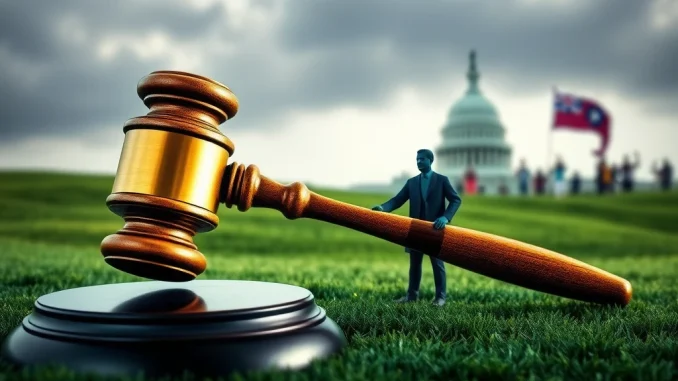
A significant development is unfolding in U.S. Congress regarding blockchain and cryptocurrency legislation. The Blockchain Regulatory Certainty Act, a bill aimed at providing clarity for certain actors in the crypto space, is moving forward.
What is the Blockchain Regulatory Certainty Act?
Introduced by Minnesota Representative Tom Emmer, this bill focuses on a key issue for developers and service providers in the blockchain ecosystem. It seeks to clarify their regulatory status, specifically addressing whether they should be classified as ‘money transmitters’.
The core idea is simple but impactful:
- If a developer or service provider does not hold or control customer funds, they should not be subject to the same regulations as entities that do handle customer money.
- This distinction is crucial because ‘money transmitter’ status often comes with extensive licensing requirements at both federal and state levels, which can be burdensome for entities that are simply building technology or providing non-custodial services.
By making this clarification, the bill intends to foster innovation by reducing regulatory uncertainty for certain participants in the blockchain space.
Why is Bipartisan Support Important?
This latest push for the bill sees a notable shift: Democratic Representative Ritchie Torres has joined as a co-lead. This makes the Blockchain Regulatory Certainty Act a bipartisan blockchain bill. In a politically divided Washington D.C., securing support from both major parties is often essential for legislation to advance and potentially become law.
Bipartisan efforts signal broader consensus on an issue, suggesting the bill addresses a need recognized across the political spectrum. For the crypto industry, it suggests that clarity on regulation isn’t just a concern for one party but has relevance for lawmakers on both sides of the aisle.
What’s the Political Context?
Despite the positive step of gaining bipartisan support, the path for crypto legislation in the U.S. remains complex. The advancement of this bill comes amid some political resistance, particularly from certain Democrats. This resistance is reportedly linked to concerns over former U.S. President Trump’s increasing ties to the cryptocurrency industry.
The political backdrop includes:
- President Trump’s more recent positive statements regarding cryptocurrencies.
- His engagement with the crypto community, including plans for events like a memecoin holder dinner.
- Some lawmakers expressing apprehension about appearing to support an industry that a political opponent is actively courting.
This situation highlights how broader political dynamics and election-year considerations can influence specific policy debates, even those related to emerging technologies like blockchain.
Why Does This Bill Matter for Crypto Legislation?
The Blockchain Regulatory Certainty Act is one piece of a larger puzzle in establishing a clear regulatory framework for cryptocurrencies and blockchain technology in the United States. Its focus on non-custodial services is particularly relevant in a space where decentralization and user control are often emphasized.
Key impacts could include:
- Reduced Legal Risk: Developers of decentralized applications (dApps), wallets where users hold their own keys, and other non-custodial services could operate with greater confidence, knowing they are less likely to be misclassified under existing financial regulations designed for intermediaries.
- Encouraging Innovation: Lowering the regulatory hurdle for builders who don’t handle customer funds can encourage more development and experimentation in the U.S.
- Setting a Precedent: Successful passage could influence how other aspects of crypto are regulated, potentially leading to more tailored approaches rather than shoehorning new technologies into old rules.
However, the political headwinds, amplified by figures like Tom Emmer and Ritchie Torres navigating the current climate, show that even seemingly technical bills can get caught up in broader political narratives.
Conclusion: Navigating the Complexities
The progress of the Blockchain Regulatory Certainty Act, bolstered by the bipartisan support of Representatives Tom Emmer and Ritchie Torres, represents a positive step towards clarifying crypto legislation. It addresses a specific, critical point about the regulatory treatment of non-custodial services, potentially clearing a path for innovation.
Yet, the political context, including the controversial figure of President Trump and related events like memecoin engagements, underscores the challenges facing comprehensive crypto regulation. The path forward requires careful navigation of both technical details and the complexities of political will and perception. This bill’s journey is a microcosm of the broader effort to integrate this new technology into existing legal and political structures.



